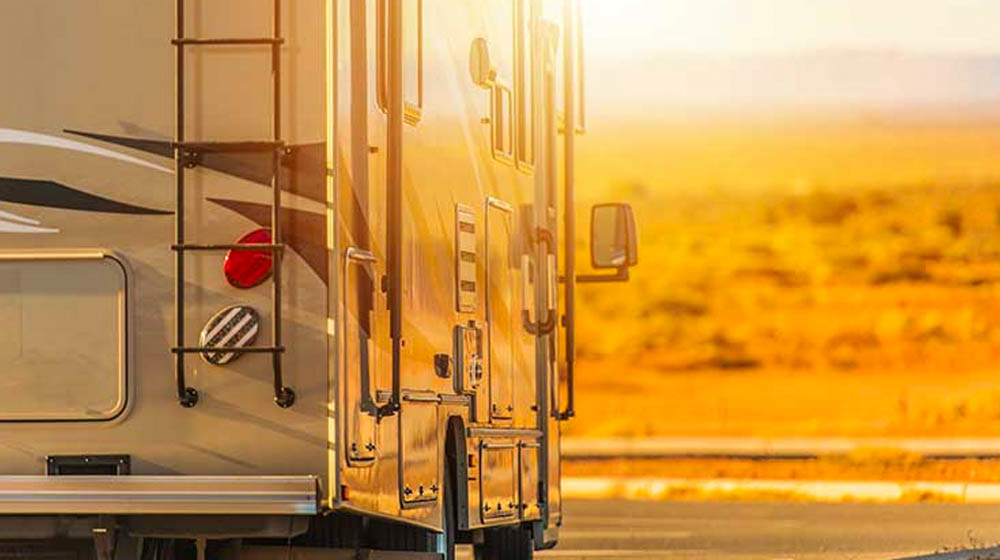There’s something fun and adventurous about owning an RV. Spontaneous road trip, anyone? If you recently bought a Recreational Vehicle (RV), it’s time to protect your investment. RV insurance — protections for you and your belongings — is much like automobile insurance. But since your RV can also act as your home, you might opt for more comprehensive policies that include similar protections as homeowners or travelers insurance policies.
RV Insurance Basics
Existing auto or homeowner insurance policies don’t usually cover RVs, so you’ll need to purchase a separate policy. (You can add a travel trailer or fifth wheel to your existing auto policy.) At a minimum, you’ll need a liability policy, though exact requirements vary by state. If you financed or rented an RV instead, you’ll most likely require additional coverage.
Depending on how much you use your RV, you’ll need to choose between a full-time policy (indicating that the RV is your primary residence) or a part-time one. These policies will have various components, depending on local requirements and options.
Automotive Inclusions and Options for RV Insurance
Some insurance coverage options are not optional. You must meet minimum state requirements first before adding additional coverage features to your plan.
Required coverage
States require you to have several policy inclusions. Check with your insurance agent and your state’s Department of Motor Vehicles to be sure.
-
Liability coverage: Pays for damage you cause others. All motorhome policies require liability coverage according to state minimums, though the specific amount of the policy will vary by state.
-
Bodily injury coverage: Required in all states except New Hampshire, bodily injury policies cover injuries that you, your passengers, or passengers in another vehicle might experience in an accident, no matter who was at fault.
-
Uninsured motorist coverage: Uninsured motorist coverage pays for vehicle damage and injuries sustained by passengers in an accident involving another motorist who is at fault but does not have insurance. Most states require this.
-
Collision coverage: Regardless of fault, collision coverage pays for damage to your rig if you’re in an accident with another vehicle. It also covers rollovers. This is required if you finance or rent the vehicle but not if you own it.
Optional policy inclusions
In all states, you have the option to choose the following additional policy features:
-
Roadside assistance: Will pay for tow truck services and various roadside repairs if your RV breaks down due to mechanical or electrical failure, even if you’re far from home.
-
Comprehensive coverage: This optional policy inclusion covers fire, vandalism, property damage, and other events, along with everything covered by the other types of coverage (specific included items may vary depending on your insurance provider).
Homeowners Inclusions and Options for RV Insurance
Most RV insurance features that mimic homeowners insurance are optional, but considering them is a good idea if you live in your RV full-time or take multiple trips a year:
-
Personal effects coverage: If your belongings are stolen or damaged, this policy coverage will pay to replace them. Coverage minimums vary. If you want to cover everything you own and keep in the RV, you’ll probably have to pay more. If you have a separate homeowners policy for your permanent residence, you might be able to cover some of your personal property inside your RV under that policy; check with your insurer.
-
Equipment and/or attached accessories coverage: This coverage will pay for damage or replacement for certain items, including your water pump, generator, antennas, and awnings. This comes standard with some policies, but others might require an additional fee to add it.
-
Emergency expenses: If you have an RV accident and need other transportation and/or a hotel, emergency expense coverage might come in handy.
-
Vacation coverage: This option specifically covers any injuries or damage occurring while the RV is parked, not while it is on the road. You can choose between comprehensive coverage or just vacation liability, which only covers injuries to others that are your fault.
-
Replacement coverage: If your RV is totaled or (under some policies) stolen, this policy will pay the actual cost of replacing the RV. This is especially helpful if your RV is a newer and/or more expensive model.
Bottom Line
The right RV insurance coverage will keep you legal on the road and provide some peace of mind. You can often save money on your RV insurance policy using the same insurer as your homeowners and automobile policies. Talk to your agent to decide what inclusions are right for you.


